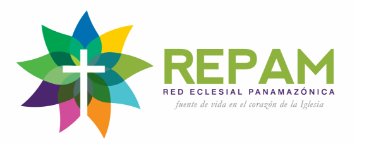In this special moment of the history of the Church, CIDSE commemorates the names of people, communities, and territories of the Amazon that have been sacrificed in the pursuit of a model of greed and colonialism which continues not only to bleed the Amazon of its resources, its cultures, its biodiversity, its colours, and splendours, but which is hurting and threatening the rest of the world as well. Murders of human rights defenders and attacks on the rights of Nature in the Amazon are evidence of how the ruling system deals with criticism. CIDSE will continue to challenge systems of impunity, alongside the most affected communities and call for corporate regulation of businesses that operate in the Amazon and exploite its resources and people, while contributing to ecological degradation.
The Synod also facilitates a dialogue on global responsibility and it brings us beyond a regional reflection on the Amazon. It is a global call to be “synodal”: to listen to the cry of the poor and the cry of the earth, to learn from experiences of sustainable way of living in harmony with nature, and with these motivations to embrace an approach of integral ecology and urgently act to protect our common home. The Synod of the Amazon can ignite a profound transformation, reminding us that everything is connected, and this is hopefully the first of among other biomes in Africa and Asia to become a focus of protection.
The Synod of Bishops for the Pan-Amazon Region: New Paths for the Church and an Integral Ecology is a key milestone in the life of the Church and the result of joint efforts by many actors in a process of several years. CIDSE sees this Synod as a continuation and a deepening of the process that was initiated by the Holy Father with the publication of the Apostolic Exhortation Evangelii Gaudium (2013, challenging the Church) and the Encyclical letter Laudato Si’ (2015, calling for social and ecological justice), as well as the collective efforts of many actors across the globe who support integral ecology and the work for a real ecological conversion. This reflection within the Church on how to build paths towards integral ecology in a specific context is the natural next step and an important responsibility. For Catholic social justice organisations, the Synod represents an opportunity to overcome the separation between spirituality and political and social action both in our work and more broadly within the Church. We look at the communities and Indigenous peoples in the Amazon fighting for and protecting Nature, seeing it as an extension of their own lives, inspired and guided by their cosmovision. Christian spirituality and engaging for global justice can and should intermingle to nurture and guide our political actions as well.
DOWNLOAD THE COMPLETE DOCUMENT AND CIDSE AGENDA DURING THE SYNOD
